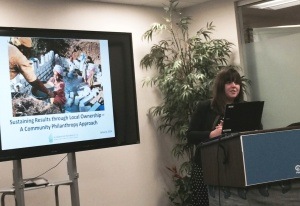“Local ownership” has been a buzzword for a long time and is widely touted as a better way forward for international development. For the Aga Khan Development Network (AKDN), local ownership is much more than a buzzword; it is a guiding force to reach long-term impact. Local initiative reduces the dependency of local organizations on outsiders. It puts local voices at the center of participatory development and ensures that projects address community needs.
I recently had the opportunity to discuss what the concept of local ownership means in practice. On January 23, I joined a panel discussion at the Society for International Development (SID-W) to examine what local ownership means in practice. Representatives from the U.S. Agency for International Development (USAID) and Plan International discussed how their organizations empower local communities and ensure local ownership.
Over the last 60 years, AKDN has embraced local ownership on the ground. For example, local ownership is at the heart of the Aga Khan Rural Support Programme (AKRSP) in Pakistan and India. AKRSP works closely with community groups to identify development priorities; make plans; and then mobilize local resources from individual community members, the government, and donors to improve food security, water quality, sanitation, and other essential services. The critical element is that communities maintain projects after they are completed – showing a full cycle of local ownership. This model of empowering local village organizations began in the early 1980s in Pakistan and has expanded to nine countries, reaching more than 12 million people so far.

AKF USA Program Officer Natalie Ross discussing our community philanthropy initiative and local ownership at SID-W.
I saw the AKDN model vividly on a recent visit to Central Asia. The people we met with on a snowy day to talk about their new community kindergarten weren’t trying to impress an outside donor. They clearly owned that project, and were explaining how it worked. It made all the difference. You can read more about this experience in Kyrgyzstan here.
At the SID-W event, David Jacobstein outlined USAID’s new systems approach and local ownership framework. In order to design programs with local solutions, USAID staff place “an emphasis on convening diverse actors to identify and understand development challenges, facilitating interaction, alliances, and partnerships for context-driven problem solving, and collaborating with local actors to solve these problems.”
Justin Fugle of Plan International called for international NGOs to “move from being implementers to facilitators” and empower local people to make decisions. Similar to AKRSP’s experience, Plan recognizes that communities see more value in programs they drive and own. I was impressed to hear that Plan tests their theory of local ownership by returning to areas where they worked previously to see what activities remain long after Plan staff has left. Five to nine years later, Plan finds that activities are sustained locally in cases where communities were involved from the start in project design and throughout implementation.
At AKF USA, local ownership is at the heart of our work on community philanthropy, which proposes three essential building blocks for making civil society organizations sustainable: assets, capacity, and trust. Community philanthropy, which in practice means local resources for local needs, ensures that community voices are at the heart of civil society. To better understand how local ownership matters to development, AKF USA has supported the development of the Global Alliance for Community Philanthropy, which is researching and evaluating the practice of community philanthropy to document and share lessons on why and how community philanthropy works. Like Plan, USAID, and others, AKDN has on-the-ground experience to demonstrate how local ownership improves development outcomes and seeks to collaborate with other development professionals to spread best practices. But all of us as development professionals need to better document how to ensure local ownership.
For more information on Aga Khan Foundation’s work in community philanthropy and supporting civil society, click here. You can also read about the January 23 panel and the Global Alliance for Community Philanthropy on Devex here. At that link you can also leave a comment to share your experience with local ownership. We invite you to do so!
By Natalie Ross, Program Officer at the Aga Khan Foundation U.S.A.